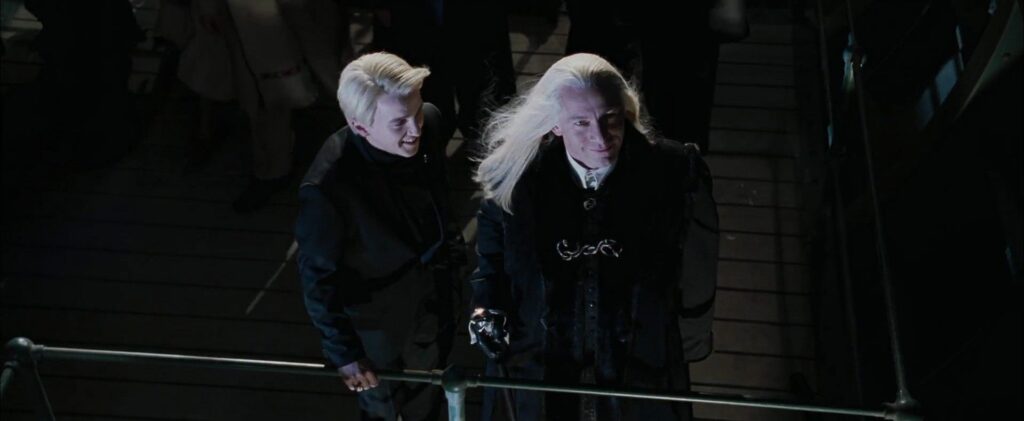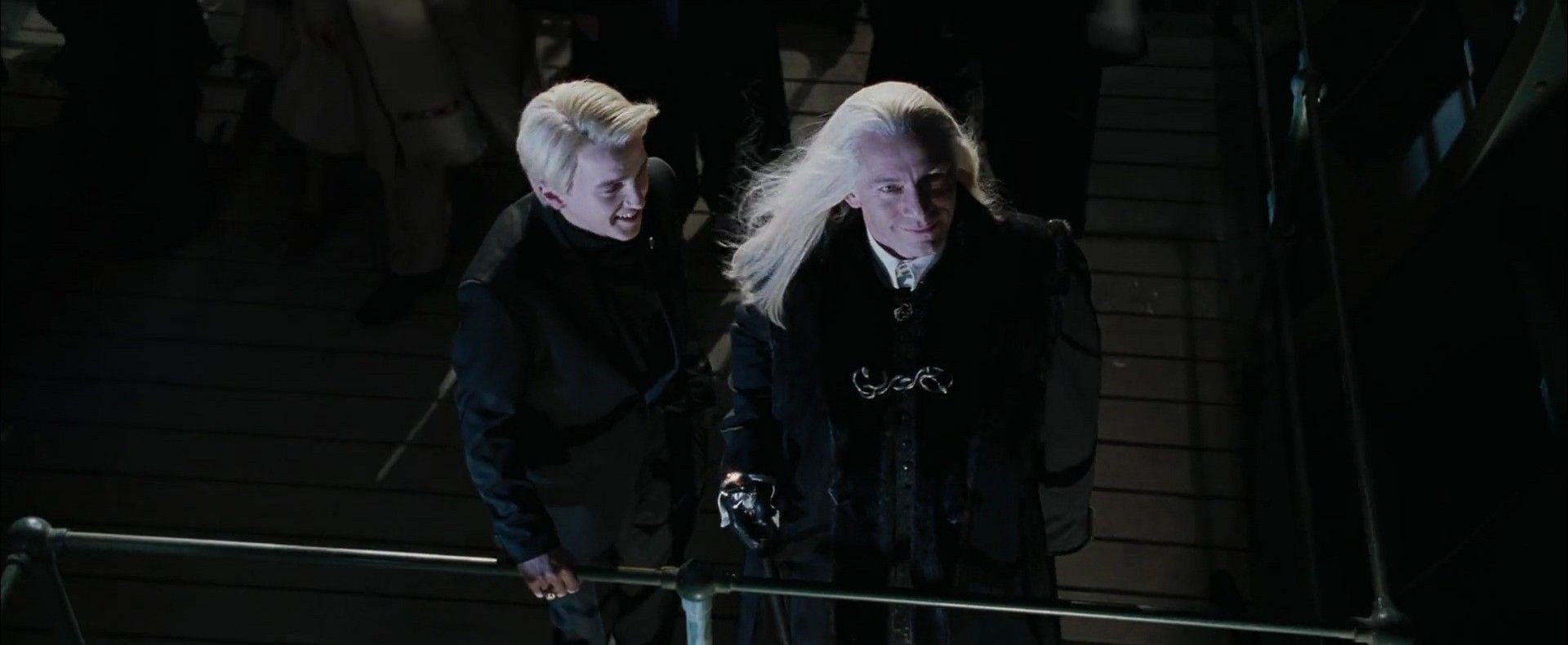
Draco Lucius: Unpacking the Complexities of a Harry Potter Anti-Hero
Draco Lucius Malfoy, a name synonymous with Slytherin ambition and a silver spoon upbringing, is far more than just Harry Potter’s schoolyard nemesis. He represents a complex exploration of privilege, prejudice, and the difficult choices one makes under immense pressure. This article delves into the character of Draco Lucius, examining his motivations, his evolution throughout the Harry Potter series, and why he remains such a compelling and debated figure in the wizarding world.
From his first appearance in Harry Potter and the Sorcerer’s Stone, Draco Lucius Malfoy is presented as an antagonist, embodying the values of his pure-blood family and showcasing a disdain for those deemed “lesser” in the wizarding hierarchy. His initial interactions with Harry Potter are marked by arrogance and a clear desire to align himself with power and influence. This sets the stage for a rivalry that persists throughout their Hogwarts years.
The Shadow of His Father: Lucius Malfoy’s Influence
Draco Lucius Malfoy’s character is inextricably linked to his father, Lucius Malfoy. Lucius, a prominent Death Eater and a staunch believer in pure-blood supremacy, casts a long shadow over Draco’s life. Draco’s beliefs and actions are largely shaped by his father’s ideology and expectations. He is raised in an environment where prejudice and elitism are not only accepted but actively encouraged. The pressure to live up to his father’s expectations and maintain the Malfoy family’s reputation weighs heavily on him.
Lucius’s influence is evident in Draco’s early behavior at Hogwarts. He parrots his father’s prejudiced views, targeting Muggle-born students and those who associate with them. He seeks to emulate his father’s power and status, aligning himself with figures of authority, such as Professor Snape. However, as the series progresses, the cracks in Draco Lucius‘s facade begin to appear, revealing a more nuanced and conflicted character.
The Burden of the Dark Mark: Draco’s Moral Crossroads
The turning point for Draco Lucius Malfoy comes in Harry Potter and the Half-Blood Prince. Voldemort tasks him with the seemingly impossible mission of assassinating Albus Dumbledore. This assignment forces Draco to confront the true consequences of his family’s allegiance to the Dark Lord. He is no longer just a spoiled schoolboy; he is now a pawn in a deadly game, burdened with a responsibility that far exceeds his capabilities.
The weight of this task takes a visible toll on Draco Lucius. He becomes increasingly withdrawn and anxious, struggling to reconcile his ingrained beliefs with the reality of the violence and cruelty he is now forced to participate in. He is caught between his loyalty to his family and his own conscience, a conflict that ultimately leads to his inability to complete his mission. While he does manage to disarm Dumbledore, it is Snape who ultimately delivers the killing blow, highlighting Draco’s moral ambiguity and his inability to fully commit to the dark side.
This period marks a significant shift in Draco’s character arc. He begins to question the values he has been taught and to recognize the devastating impact of Voldemort’s reign. He is no longer simply a bully; he is a young man grappling with a moral crisis, forced to make impossible choices in a world consumed by darkness.
Redemption or Regret: Draco’s Post-Hogwarts Life
Following the Battle of Hogwarts, Draco Lucius Malfoy and his family are spared imprisonment, likely due to Narcissa Malfoy’s crucial role in saving Harry Potter’s life in the Forbidden Forest. However, they are forever marked by their association with Voldemort and face social ostracism and financial hardship.
In the epilogue of Harry Potter and the Deathly Hallows, Draco is seen with his wife, Astoria Greengrass, and their son, Scorpius. While the epilogue provides limited insight into his post-war life, it suggests that he has distanced himself from the prejudiced views of his upbringing. His marriage to Astoria, who held more tolerant views on Muggles and Muggle-borns than the Malfoy family, further indicates a shift in his perspective.
However, the extent of Draco’s redemption remains a subject of debate among fans. Some argue that he never fully atones for his past actions, while others believe that his struggles and his eventual distancing from his family’s ideology represent a genuine change of heart. The ambiguity surrounding his character adds to his complexity and makes him a compelling figure for analysis.
Why Draco Lucius Matters: Exploring Themes of Prejudice and Choice
Draco Lucius Malfoy’s character is significant because it explores important themes of prejudice, privilege, and the power of choice. He serves as a cautionary tale about the dangers of blindly following tradition and the importance of challenging ingrained beliefs. His journey from a prejudiced bully to a conflicted young man grappling with his conscience highlights the complexities of human nature and the potential for change, even in the face of immense pressure.
He is a product of his environment, shaped by the values and expectations of his family and the wizarding world. However, he is also capable of independent thought and moral reasoning. His struggles to break free from the constraints of his upbringing and to make his own choices resonate with readers of all ages. He reminds us that even those who seem irredeemable may be capable of growth and change, and that true redemption lies in acknowledging our past mistakes and striving to do better.
The Enduring Appeal of a Flawed Character
Despite his flaws and his association with the dark side, Draco Lucius Malfoy remains a popular and fascinating character. His complexity and his internal struggles make him relatable, even to those who disapprove of his actions. He is not a simple villain; he is a nuanced and multifaceted character who challenges our assumptions and forces us to confront difficult questions about morality, prejudice, and the choices we make in life.
The fact that Draco Lucius is not easily categorized as good or evil is precisely what makes him so compelling. He embodies the gray areas of morality and reminds us that individuals are rarely entirely one thing or another. His journey is a testament to the power of empathy and the importance of understanding the complexities of human behavior. He is a reminder that even those who have made mistakes can learn and grow, and that redemption is always possible.
Ultimately, Draco Lucius Malfoy’s legacy lies in his ability to spark discussion and debate about the themes of prejudice, privilege, and the choices we make in life. He is a character who challenges us to look beyond the surface and to consider the complexities of human nature. He remains a compelling and enduring figure in the Harry Potter universe, a testament to the power of well-developed and morally ambiguous characters.
The character of Draco Lucius serves as a powerful reminder that even within a fantastical world filled with magic and wonder, the most compelling stories are those that explore the complexities of the human condition. His journey is one of struggle, conflict, and ultimately, the potential for change, making him a character that will continue to resonate with readers for years to come. [See also: Snape’s Redemption Arc] [See also: The Morality of Albus Dumbledore]
Draco Lucius Malfoy is a key element to the tapestry of the Harry Potter universe, and understanding his motivations is essential to understanding the overarching themes of the series.
The lasting impact of Draco Lucius is undeniable, solidifying his place as one of the most intriguing characters in modern literature.

